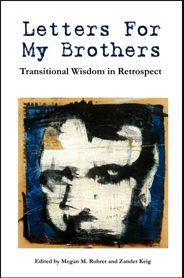
Edited by Megan M. Rohrer & Zander Keig. 2010 Wilgefortis. Kindle Edition.
With writing by: Jamison Green, fAe Gibson, Cristopher Bautista, Chase Ryan Joynt, Malcolm Himschoot ,Lou Sullivan, Reid Vanderburgh, Aaron Raz Link, Elliott Anthony Brooker, Aaron H Devor, Patrick M Callahan , Zander Keig, C.T. Whitley, Raven Kaldera, Tucker Lieberman, Lyle Blake, Keith Josephson, Evan Anderson and Matt Kailey.
The book provides the newly-transitioning man with the wisdom of nineteen older brothers who have traveled the road before and offer their views, advice and thoughts on the trip. As one of the editors – Megan Roher notes in the introduction to this Kindle book “Transmen, who rely solely on online materials to learn about transition, miss out on the wisdom that can only be found in a mentorship experience.”
The short, to the point chapters are a refreshingly devoid of artifice. The standouts (for me) are Christopher Bautista’s essay which expresses the powerful impact of acceptance:
…reading that little piece of paper was the most terrifying thing I had ever done. But the entire class of a hundred something people, all of them, started clapping for me. All of that previous frustration from the quarter melted away. I had made my declaration to the class, and they had accepted me. I had never thought this would happen. I no longer had to pour so much effort into trying to pass as a guy, to dress like one, act like one, talk like one, like I had to do in the outside world. My class was fine with who I was, awkwardness and all. And for the first time that quarter and in my whole life, I felt like I belonged somewhere. It felt like home.
Chase Ryan Joynt’s essay expresses doubt and uncertainty about what type of man he should be and will be.
…I struggled for a long time with the various versions of masculinity that were represented in my community. Upon reflection I think that I subconsciously attempted to fit myself into the versions of trans that I thought were acceptable and available…
Reid Vanderburgh gives clear advise and reassurance on various tricky points in transition, such as:
Let yourself feel lonely. You’re losing your lesbian community, and you don’t yet have community to replace it. That’s okay. You didn’t fit that identity, and now that you know it, you really can’t stay. Know that in the future, your individual lesbian friends are still going to be there, but it’s not going to be the same.
Aaron H Devor, an academic writes particularity well on discoveries about male privilege:
…everything I say now sounds more authoritative, or more ominous, or both. Sometimes that works in my favour. Sometimes, especially with women, that evokes fear, resentment, or hostility. I think that I’m just making a plain statement. They see and hear me throwing my weight around. I get tense and may raise my voice a bit in anger because I’m hurting. They perceive me as being scary and abusive.
There are more examples, but I recommend getting the book!
On the down side the writing was uneven, as can be expected in a group project and there was somesubtle anger towards male to female trans folk: “…I have quit working at [].. Felt I was wasting my time on all those male-to-females.” and “In hindsight, not being in that group was one of the best things that could have happened to me, as it was led by a domineering transwoman who had a ‘my way or the highway’ attitude about how transition was supposed to work.”
However, that aside, there’s a lot of wisdom, comfort and inspiration to be found in these pages and any newly transitioning trans-man will want to read them at least once if not more and hopefully will also be inspired to go out and find some real-live brothers to connect with.

